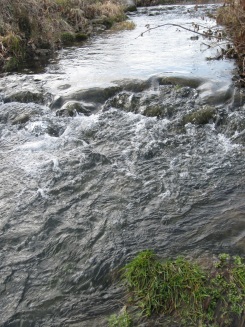 Stormwater pollution can have a significant impact on the quality of surface waters
and the surrounding ecosystems. East Tennessee State University strives to mitigate
the impact of stormwater runoff from its facilities. To that end, ETSU is implementing
numerous pollution prevention and good housekeeping practices that will minimize its
contribution to stormwater pollution.
Stormwater pollution can have a significant impact on the quality of surface waters
and the surrounding ecosystems. East Tennessee State University strives to mitigate
the impact of stormwater runoff from its facilities. To that end, ETSU is implementing
numerous pollution prevention and good housekeeping practices that will minimize its
contribution to stormwater pollution.
This website offers you information on stormwater regulations, University stormwater management practices and ways you can prevent stormwater pollution on campus.
Why does ETSU have a stormwater management plan?
East Tennessee State University is required to be permitted under the Tennessee Water Control Act of 1977 (T.C.A. 69-3-101 et seq.), the EPA underwriters Federal Water Pollution Control Act as amended by the Clean Water Act of 1977 (33 U.S.C. 1251 et seq.) and the Water Control Act of 1987, P.L. 100-4. ETSU, as an operator of a small municipal separate storm sewer system, is authorized to discharge stormwater runoff into waters of the State of Tennessee. ETSU and Johnson City have agreed to co-permit because all applicable stormwater from the main campus discharges into those streams encompassed by the existing Johnson City stormwater permit.
What is stormwater runoff?
Stormwater runoff occurs when precipitation from rain or snowmelt flows over the ground. Impervious surfaces like driveways, sidewalks and streets prevent stormwater from naturally soaking into the ground.
 Why is stormwater runoff a problem?
Why is stormwater runoff a problem?
Stormwater can pick up debris, chemicals, dirt, and other pollutants and flow into a storm sewer system or directly into places like Brush Creek that runs through campus. Anything that enters a storm sewer system is discharged untreated into the waterbodies that flow through our community.
What is stormwater management?
Stormwater management is the process of controlling stormwater runoff for the purpose of reducing erosion, water quality degradation and flooding. Stormwater management control measures are often referred to as Best Management Practices (BMP). BMP's can either be structural or nonstructural measures taken to mitigate changes to both the quantity and quality of runoff.
How can we improve stormwater quality?
Stormwater pollution can be controlled if everyone plays a part in managing stormwater runoff. The most effective way to reduce stormwater pollution is to prevent pollutants from entering the system in the first place.
Examples of Good Housekeeping Practices at ETSU
- Neat and orderly storage of chemicals in a proper manner and location.
- Prompt cleanup and removal of spillage.
- Regular garbage pickup and disposal.
- Provisions for proper storage and inspection of containers, drums and above ground storage tanks.
- Prevention of accumulation of liquid and solid chemicals on the ground or floor in buildings.
- Work surfaces, floors and ground surfaces are cleaned on routine basis.
- Equipment is routinely inspected for leaks or contact of storm water with raw or waste materials.
- Equipment, which is not working properly, is promptly taken out of service for repair.
- Train and abide by Spill Prevention Control & Countermeasures Plan.
- Store materials so that there is adequate aisle space to facilitate material transfer.
- Store containers, drums and other containers indoors or in enclosed storage units and way from direct traffic routes to prevent accidental spills.
- Store containers according to the manufacturer's instructions.
- When necessary, store drums/containers on pallets to prevent corrosion.
- Maintain good material inventory practices that can reduce the waste that results from overstocking and the disposal of out-of-date materials.
- Maintain preventive maintenance program for University vehicles.
- Periodic inspections and testing of equipment and systems including examination for leaks, corrosion,
- foundation failure, or other forms of deterioration.
- Store hazardous waste in designated facility building.
- Use commercial car wash to clean vehicles.
- Vehicle maintenance involving oil and other mechanical fluids not performed in campus parking lots.
- Utilize campus recycling program.
- Store bulk salt in covered storage building.
- Fertilizers and pesticides stored inside to prevent runoff to storm drains.
How to Report an Illicit Discharge
If you suspect an illicit discharge or observe improper disposal practices, report the incident to ETSU Police Department at 423-439-4480 which in turn will contact the Environmental Health and Safety (EH&S) Office at 423-439-7900 who will perform the investigation.
The following information should be gathered and recorded:
- Location of suspected discharge
- Date
- Name of caller and call back number
- Where discharge is coming from (pipe, parking lot, vehicle, ect.)
- Description of discharge
- Possible source
Once the above information is recorded, EH&S personnel will perform a site visit, document conditions of the suspected illicit discharge, note which waters are receiving the discharge and then investigate the source. From this information, appropriate corrective actions will be taken to stop or mitigate the source of the illicit discharge such as blocking storm drains, cleaning up oil spills with absorbent material and using absorbent pads to clean up oil sheens in waterways.
The ETSU EH&S Office will inform the City of Johnson City Stormwater Management Office of any illicit discharge as ETSU and the City of Johnson City have agreed to co-permit, and as all stormwater from the main ETSU campus discharges into those streams encompassed by the existing Johnson City stormwater permit. ETSU will request additional assistance and/or resources from the City of Johnson City depending upon the conditions and severity of the illicit discharge.
ETSU Stormwater Links
Federal Stormwater Links
- EPA Stormwater Program Homepage
- EPA Best Management Practice for Stormwater
- Make Your Home the Solution to Stormwater Pollution - EPA Brochure (PDF)
State and Local Government Links
 Upcoming Phone Firmware Updat...
Upcoming Phone Firmware Updat...  Annual Steam Shutdown--2025
Annual Steam Shutdown--2025